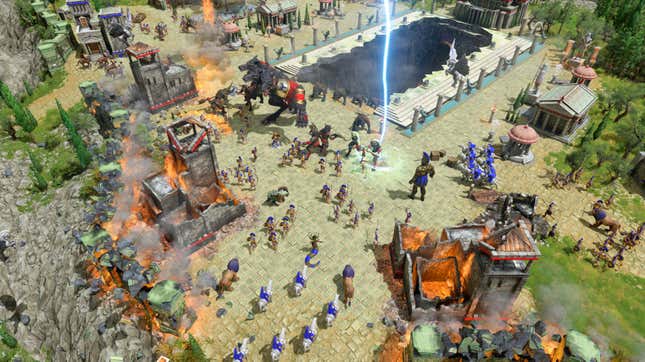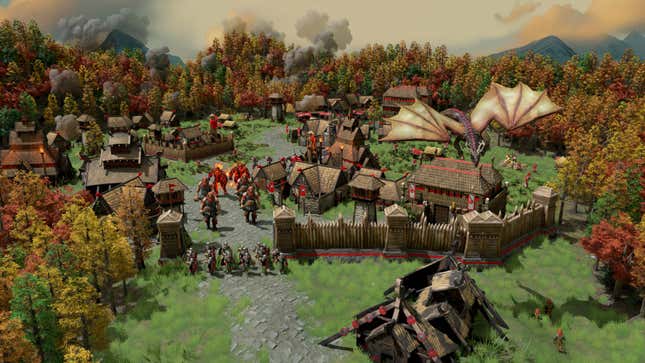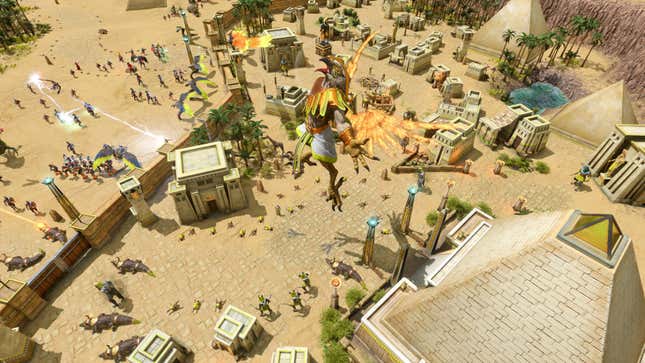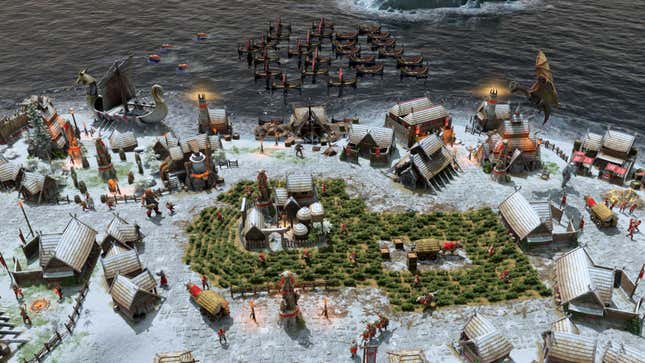Releasing September 4, Age of Mythology: Retold is the fourth and final remake of Assemble’s classic early 2000s Age Of… RTS series, following on from the legendary Age of Empires III. Released at a time when strategy games ruled PC gaming, all four games have remained well loved over the intervening 15 to 20 years, receiving various updates and re-releases, before Microsoft’s more focused project to see them all entirely overhauled and updated for modern audiences, with the subtle introduction of more modern sensibilities.
You might imagine that such a project would be a sideline for one of the biggest games companies in the world, the effort of a dedicated few tucked away in some converted stationary cupboard, but that’s wildly off the mark. In fact, for Age of Mythology: Retold, there’s a total of five different studios working on the game, overseen by a Microsoft studio created for the projects, World’s Edge. And executively producing them all is a Microsoft stalwart, an exec producer of games going back as far as 2002’s Blinx and the wonderful Xbox 360 title, Viva Piñata, Earnest Yuen.
(When I mention Blinx, Yuen is taken aback, because it seems I’m not the first journalist to bring it up in interviews. I hold my tongue, and instead move on to 360 launch game Kameo. He recalls that it was the first game manufactured for the console before the console itself was even available to buy. We all mimed staring at a disc in our hands.)
“The way World’s Edge was set up from the very beginning was to be a studio that managed the Age of Empires franchise, following something similar to say, the Marvel studio!” This rather grand comparison is something Yuen couldn’t quite get through without laughing, as he tried to add that his job was to “manage the sacred timeline.” Then, rather more moderately, he continues, “[We’re there] to seek out people we think are great, and then pair them up so that everybody can concentrate on what they’re good at.”
At five teams, Mythology Retold is, if anything, a more modest setup, given Age II had “seven or eight” teams working on it. Yuen’s logic is that not everybody is great at everything, “but that each company is excellent at some of the things they do. So we pair different groups up so they can do what they’re best at, and we coordinate.”
In fact, two of the teams working on Myth are companies that World’s Edge helped to set up, built from people they knew were experienced developers who were dedicated fans of the original game. Overseeing it all is obviously a big logistical task, but Yuen says the only downside is timezones, with teams in Australia, Canada and elsewhere. No matter what time an all-hands meeting is arranged, someone’s going to be up at midnight.

When remaking the Age Of titles, World’s Edge and its litany of co-developers have a difficult balancing act. These are titles that have had deeply dedicated fanbases for the best part of 25 years, audiences that are still involved in the games, who of course are very passionate about the original versions and their spirit. Then again, RTS is not the all-dominating genre it was in the late ‘90s, early ‘00s, and the format’s peculiar sensibilities and sometimes impenetrable systems are no longer suitable for a broader audience.
But senior game designer Kristen Hanlon-Pirillo explains that even though the older audience is very passionate, “they’re also very collaborative.” A large part of the process of returning to Age of Mythology involved going back to 15-year-old forums, looking at how people were commenting on it then, looking at what exploits were used, and how people were playing the game then. “Then, on the design side, asking, ‘How much of this can we iron out?’”
A lot of what World’s Edge discovered was that people were trying to play Age of Mythology as if it were an Age of Empires game, and as such missing out on the key elements the spin-off game included, especially the roles of gods and god powers, foregoing Heroes, and as such missing the core of the game. “We wanted to answer the question,” says Hanlon-Pirillo, “How can you play Age of Myth as if it was an Age of Myth game?”

The other main pillar of the approach to updating was addressing elements that were simply impossible to achieve in 2002. “Things like population cap, favor cap, those were no-brainers. So we can have more crazy attacks, more special effects.”
However, it wasn’t until working out how to transfer these traditionally mouse-and-keyboard games to consoles that they stumbled upon a whole host of other quality-of-life improvements for PC players too. When adding elements like “the villager priority system,” or “AI assist for the economy,”—designed to make the game more approachable with a controller, where clicking on every single element is a less nimble option—it became clear these would be beneficial for PC too. “It lowers the cognitive load,” says Hanlon-Pirillo. And while you might imagine this would cause sirens to go off in the heads of the long-term fans, it seems such changes improve the game even for the most popular ways it’s still played, by competitive multiplayer. “[Units are] more self-reliant, not to the point where they take over, but so you don’t have to babysit them like lost ducklings,” adds Hanlon-Pirillo, saying that feedback from the extremely responsive community is positive. That’s also in large part thanks to the teams taking the opportunity to “flush out” the core complaints about the game from its original release, and fix those too.
Oh, and the turtles. Not a strange new creature being added to the game, but the nickname given to the sorts of players who approach RTS games from a purely defensive perspective. “They’re just not offensive,” says Hanlon-Pirillo. “They’re not belligerent, they’re very strategic, they store all of their resources. It’s called turtling.” I comment that my father was the king of the turtles. “I love turtles!” Hanlon-Pirillo replies, but points out that a lot of Myth’s design was expecting players to be more offensive, especially when playing the Norse race. As such, a lot of people fell off at this point in the game. So to address this, they’ve rebalanced the Norse campaigns, introduced new unit types and building types, and given access to more powerful units sooner. “It was a balancing act,” the developer adds, “because we still want to make sure the [civilization] is still something you need to hone your skills for.”

There’s an elephant in the room when it comes to remaking Age of Mythology. In 2014, Age of Mythology: Extended Edition was released, updating the game with Steamworks integration, modern resolution options, Twitch support, and tweaks to the graphics. This was then followed in 2016 by a brand new expansion, Tale of the Dragon, adding the Chinese as a playable culture along with new gods, new campaigns and new multiplayer. There were two issues. Firstly, this was made by SkyBox Labs, then with Microsoft but now—after working on Halo Infinite—owned by NetEase. Secondly, it wasn’t great. Beyond only being a slight update, there were issues with multiplayer, and the game felt anachronistic in the mid two-thousand-and-teens. But worse was that Dragon expansion, receiving a derisory response from many, and sitting for years with that disastrous orange-text “Mostly Negative” on Steam.
Both Retold developers were far too polite to get into any of this. But given the lively community surrounding the game, need to make clear their plans. “We’ve heard from the fans,” says Earnest Yuen, “and it was certainly a controversial expansion.” As such, no, the Tale of the Dragon expansion is not going to be included in this version, but instead a whole new Chinese expansion is being worked on. The Premium Edition of this remake will come with two DLC packs, the first of which is the “all-new Chinese expansion.” There’s no more details for now, the DLC arriving post-launch, but it seems like a smart compromise.
The other DLC returns to that offensive Norse campaign, adding four new Gods, powers, upgrades and units, and the spreading effect on the metagame, with the aim to offer a properly defensive approach to the region.

So, of course, given this is the final game in the older Age Of franchise to remake, and, well, how they’re making new expansions for it… Surely? Surely, right? Age of Empires V is just sitting there, in the ether, unmade. “It does sound a lot like you’re in a position where you kind of want to make something new?” I asked, my voice going ridiculously high at the end as I try to goad them into an answer I know they won’t give. I came closer than I thought!
“So…” began Yuen. “I…” he continued. “We…” he added. “I would love…” he so temptingly continued. And then catching himself went back to the clearly rehearsed line of, “So, we are launching the game on September 4, our goal is this will be a game that will continue to be updated and nurtured and…” Just imagine me turning down the volume at this point. So I tried again.
“I know you don’t want to answer this, but you must be tempted make a whole new one! You’ve got everything in place, right? Teams in place, all these experts…”
“Yes,” says Yuen, gently cutting me off. “We do have a lot of people that are very interesting in building more Age.” Come on, come on. “And that is definitely something that we need to…” YES?! “Right now, we need to focus on making Age of Mythology: Retold the best game out there.” Goddammit.
.








